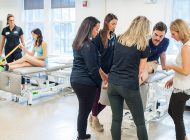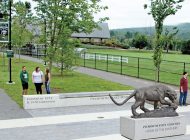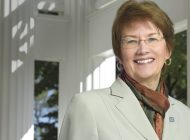Meeting regional needs and providing unprecedented professional opportunities
When assessing growth opportunities for physical therapists in New Hampshire, the numbers say it all. The June 2014 report on New Hampshire Employment Projections by Industry and Occupation through 2022 anticipates 66 physical therapy job openings annually, with a 31.1% growth rate, and categorizes the profession with a “Very Favorable” descriptor. As chair and program director of Plymouth State University’s Department of Physical Therapy Professor Sean Collins, PT, ScD couldn’t be happier.
Collins came to Plymouth in the summer of 2015, hired by Dean Gail Mears and then-Provost Julie Bernier to establish a Doctor of Physical Therapy (DPT) program. “As the northern-most university in the state, Plymouth State has an obligation to make a positive contribution to healthcare in the region,” asserts Bernier. “Historically, the North Country has had difficulty attracting and retaining healthcare providers, so expanding our offerings in healthcare was a priority. We were fortunate to attract Dr. Collins. His leadership in establishing the DPT program has been exceptional.”
As soon as Collins arrived at Plymouth State, he got to work, designing a curriculum for the new DPT program and taking the steps necessary to get the accreditation process underway. On November 30, 2016, the efforts of Collins and his team were rewarded with the granting of “candidate for accreditation status” from the Commission on Accreditation in Physical Therapy Education (CAPTE); the program welcomes its inaugural class in June of 2017. “We’ve committed to a maximum class size of 30 to facilitate greater faculty-student connections and to avoid overusing clinical sites in the region,” Collins notes.
Initial response to the nascent program has been overwhelmingly positive. “Regional practitioners are excited about helping doctoral students obtain practical experience, and they appreciate the continued professional development that the partnership will encourage as well,” says Deirdre “Dee” Daley, director of clinical practice at WorkWell Prevention & Care and president of the New Hampshire chapter of the American Physical Therapy Association.
Collins is grateful for the positive reception and says that interaction with the broader campus and local community is precisely what’s needed to allow students to integrate their conceptual knowledge with practical skills. “As a member of PSU’s new ‘Health and Human Enrichment Strategic Cluster,’ the physical therapy program has unprecedented opportunities to allow students to interact with campus and community partners to serve a community need, while at the same time gaining valuable, hands-on experience in the field,” he says.
“As we look to the future, the University is transitioning to a cluster-based model,” notes Bernier. “Under this model, opportunities for integrated learning will bring DPT students together with students in business, marketing, psychology, biology, health, graphic design, or computer technology to partner with organizations or businesses in the region to develop new products or deliver services. The clusters will provide an opportunity for students to have more hands-on experiences in interdisciplinary teams, much like those they will work in when they begin their careers. Interdisciplinary clusters will allow students to bring their discipline expertise to bear on the project or problem at hand.”- Lori Ferguson
PSU’s Doctor of Physical Therapy program is currently accepting applicants for the Class of 2017. For more information, please visit our website, https://www.plymouth.edu/department/physical-therapy/.
Standardized Patients: An Interdisciplinary Project
For years, Standardized Patients (SPs) have been used to give students in medical disciplines the chance to learn and be evaluated on their acquired skills in a simulated clinical environment. But when PSU’s Director of Physical Therapy Dr. Sean Collins approached Paul Mroczka, chair of Plymouth State’s Department of Music, Theatre, and Dance, about the possibility of theatre students acting as patients for the university’s new DPT program, both realized there was an opportunity to take the concept a step further.
Faculty from the departments of nursing; counselor education and school psychology; social work; athletic training; and communications and media studies were quickly pulled onto the development team, along with retired physician Mary Catherine Gennaro, a family practice doctor with theatre experience. Now, after months of work, the team is preparing to launch a cutting-edge initiative that will not only provide a vital training component for the University’s new DPT program, but also offer opportunities for interdisciplinary initiatives across the campus.
For physical therapists, formulating a treatment plan on paper is one thing, explains Kelly Legacy – assistant professor and director of clinical education in the Department of Physical Therapy and a driving force behind the SP initiative – but initiating it with a real person is another. “As a therapist, you must consider not only the patient’s pathology but also his or her job, recreational activities, lifestyle, etc., and treat accordingly. You have to find a way to fit the constraints of your treatment plan into the patient’s life.”
Recognizing this, Legacy and Collins have incorporated an Objective Structured Clinical Exam, or OSCE, into the DPT program that utilizes SPs and will be employed every semester to test students on their coursework. Standardized Patients follow a specific script when playing a role, explains Legacy, using specific lines that prompt students to ask appropriate follow-up questions or perform appropriate tasks. “A peer volunteer is oftentimes a little too helpful to the examiner,” notes Dr. Gennaro, “whereas a formally trained Standardized Patient knows exactly what to say and do to test a student’s knowledge base.” Standardized Patients also participate in the evaluation of the student by assessing the student on his or her bedside manner, Gennaro adds.
“Hiring Standardized Patients can be quite expensive, and when we started looking at all of the health science programs here on campus, we realized that a lot of departments could probably use SPs, so we thought, ‘Why not train our own students to play these roles?’ says Legacy, who believes that such a move offers Plymouth State a powerful differentiator. “I’m not aware of any other institutions who are training their own students as SPs, and by having so many of our faculty certified as educators, we also have the opportunity to become known as a center for Standardized Patient curriculum development.”
Because they have already demonstrated an interest in acting, SP students will be drawn primarily from the Department of Music, Theatre and Dance, notes Legacy, although those from other disciplines will not be excluded. Students will complete coursework to become certified as a Standardized Patient and will then be employed in physical therapy OSCEs and labs. The certification will also equip them to earn money as SPs after graduation should they so desire.
First, however, faculty at Plymouth State must themselves obtain certification, both to serve as Standardized Patients and to educate others. This training begins soon and will be led by faculty from the University of Illinois College of Medicine at Chicago, who will travel to Plymouth to train up to 16 PSU faculty. They, in turn, will train other SPs, develop SP cases and formulate SP-based instructional programs. “By using Standardized Patients in our curriculum, we’ll not only give students the confidence they need to handle patients in real-world situations,” Legacy concludes, “but also better prepare them to work with clinical partners as they progress through their education.”- Lori Ferguson
Lori L. Ferguson is a freelance writer based in southern New Hampshire. She enjoys writing on lifestyle and health and wellness topics, as well as all things artistic.
Tags: CAPTE Commission on Accreditation in Physical Therapy Education doctoral program DPT program Gail Mears Health and Human Enrichment healthcare physical therapy PT Sean Collins














